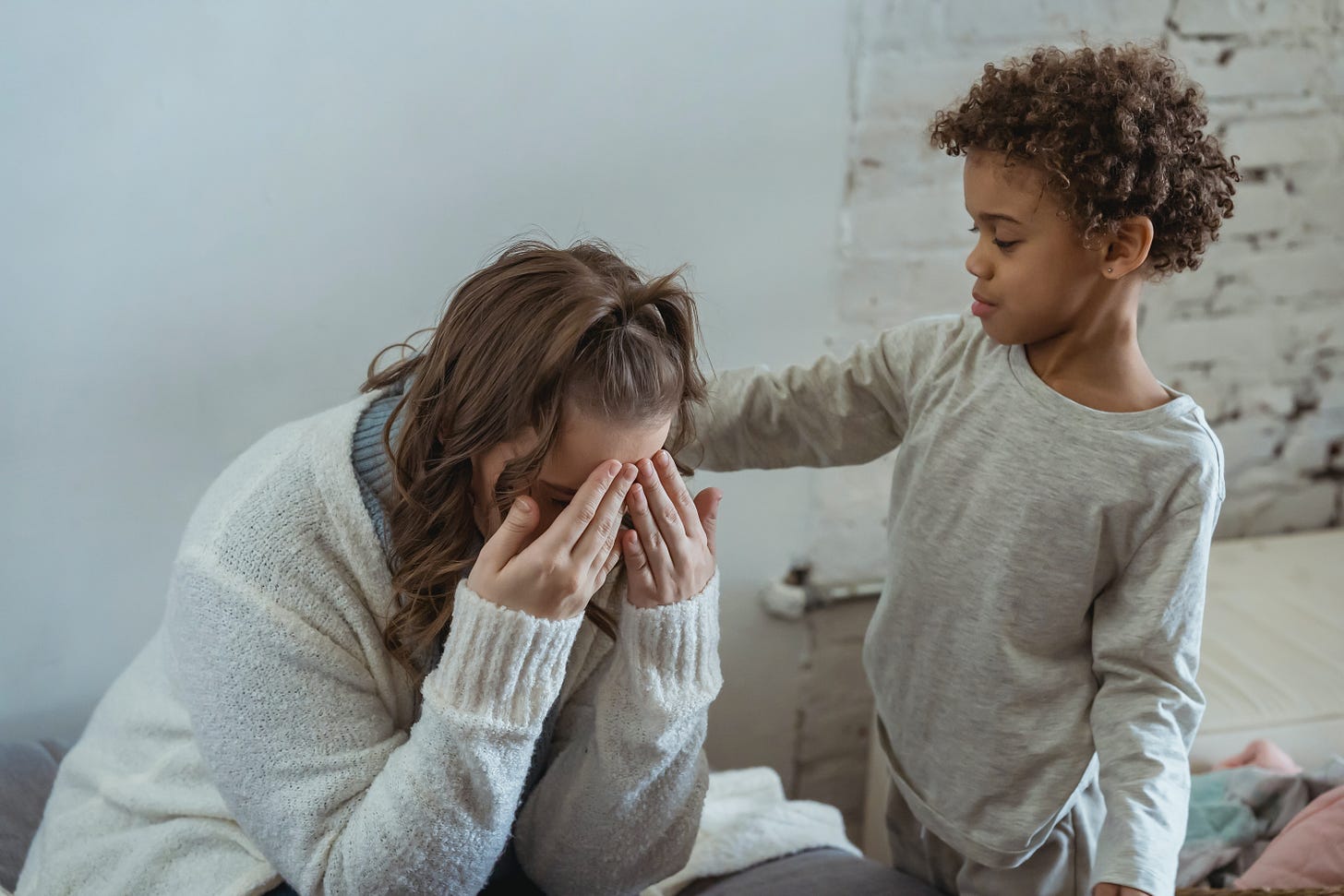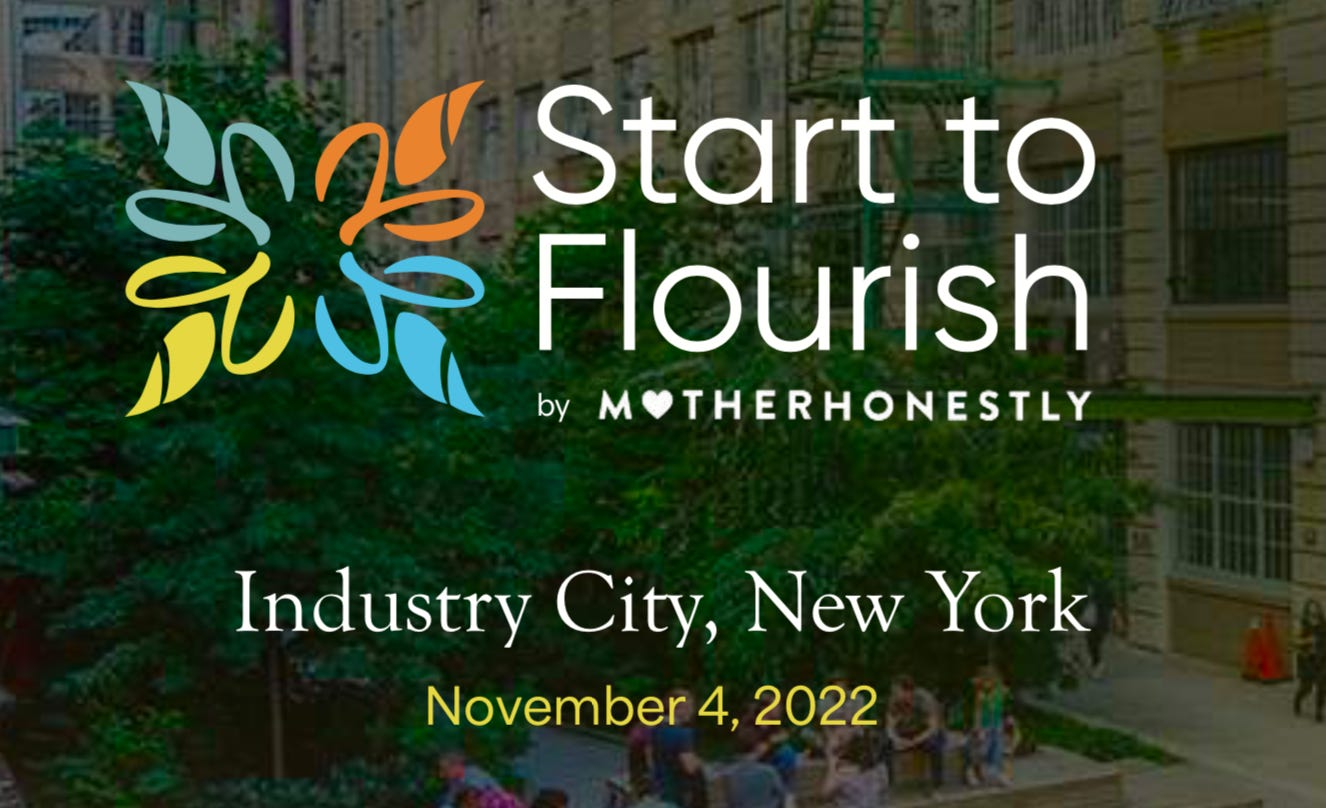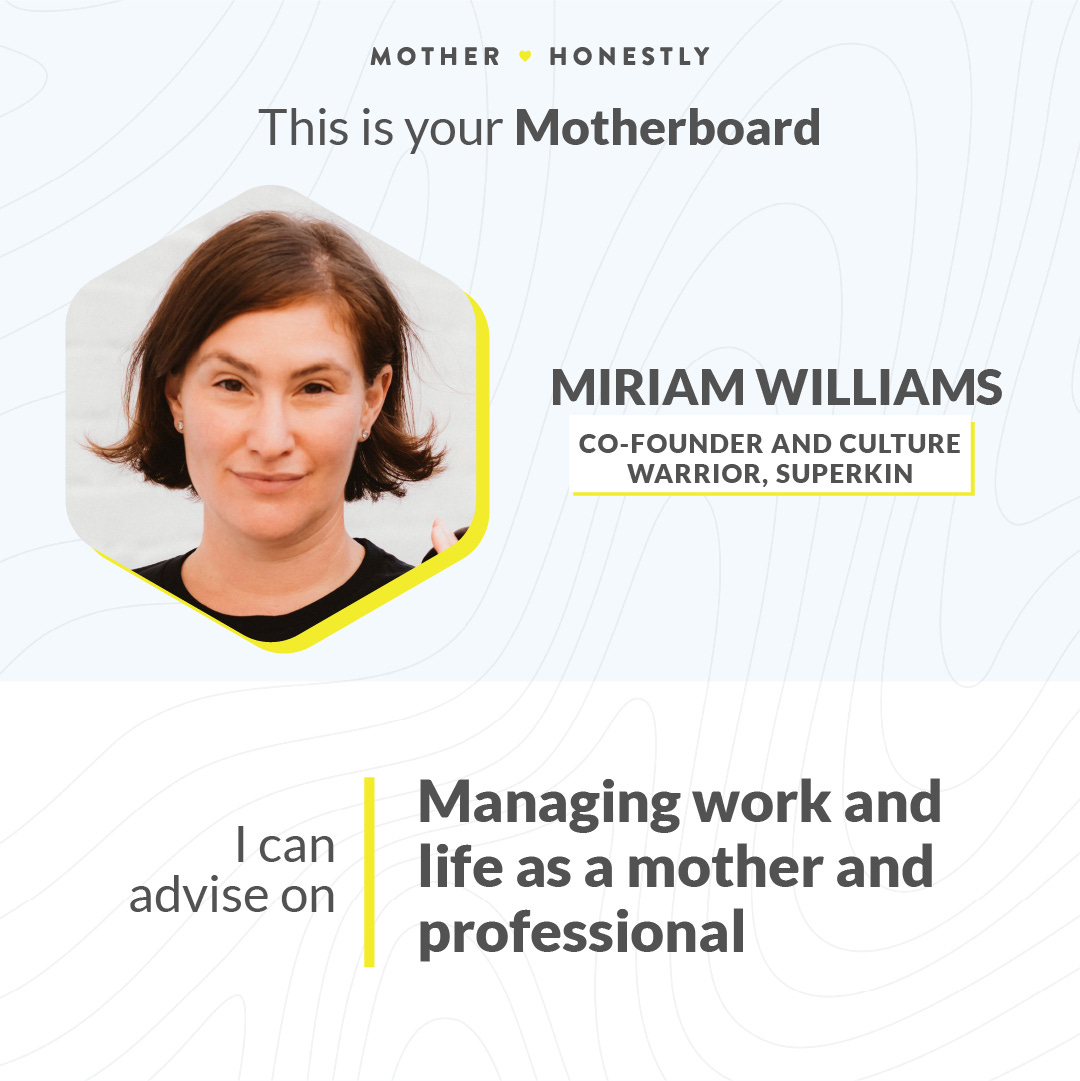Motherhood Was Never Supposed to be this Isolating
Health journalist and author Chelsea Conaboy reveals how the myth of the maternal instinct makes parenting harder.
I lived with my parents and my in-laws this summer, and I loved it. I recommend it wholeheartedly.
I probably wouldn’t have felt that way when I was new to parenting. In those early years, I bristled when strangers or loved ones offered unsolicited advice regarding my son. As his mother, it was my job to ascertain and meet his needs. After all, I would know instinctively what he needed.
I was wrong. I had fallen for an age-old scam. That near-mythological belief in maternal instinct is just that, a myth, according to health journalist Chelsea Conaboy, the author of Mother Brain: How Neuroscience Is Rewriting the Story of Parenthood. In her just-released book, Chelsea breaks down how brain imaging technology and other research is revealing that it’s not just pregnancy that prompts changes in the brain. The caregiving circuitry that helps people become better parents is also driven by experience. Our brains are rewired by caregiving, no matter if we’ve given birth or not.
That’s a pretty consequential finding for several reasons. First, it should give relief to women who feel confused, anxious and uncertain in those fragile first few months of motherhood. (You know, all of us.) Yes, our brain changes during pregnancy and birth, but parenting isn’t entirely innate. We don’t push out the ability along with the placenta. We learn over time how to meet our child’s needs, as our brain adapts and builds those skills.
It also means there’s no reason for modern motherhood to be so isolating. Anyone who invests time and attention in caregiving can acquire the ‘instinct.’ Yes, that includes dads, but it also means family, friends and paid caregivers can provide wonderful support, too. It’s just another reason to keep building a world where moms don’t carry so much of the caregiving burden alone.
Or, perhaps, to return to a time when that was the norm. Evolutionary history, Chelsea notes, also seems to debunk the notion that moms are supposed to do most or all of the parenting. “Alloparenting,” defined as care provided by individuals other than parents, was probably pretty common throughout human history. (It’s also very common in other animal species, too.)
After seven years of motherhood—and parenting through a pandemic—I’m now a big believer in the concept. My husband and I live in New York City, thousands of miles away from our families. Though we outsource as much as we can, it’s still exhausting to work and take care of two small children.
That’s why I split the summer living with my parents and in-laws, who helped care for my kids, along with an array of aunts, uncles and older cousins. I did very little cooking and cleaning. I rarely went to the grocery store or thought about meal planning. I finally had time to read a few books, to see friends and to travel.
Apparently, multigenerational living has seen a sharp rise among adults ages 25 to 34. This was billed by the media as a bad sign that student debt and soaring home prices have made it virtually impossible for young adults to strike out on their own. That’s likely true, but given the intensive demands of modern parenting, it might be a blessing in disguise for the young adults who have a built-in support network when and if they become parents.
I had a fascinating chat with Chelsea about her book, and why the misguided belief in a maternal instinct has made motherhood so difficult and isolating:
Reading your book, I thought about a National Geographic documentary I watched with my son, where a lion cub went missing. It turns out the cub’s aunt had simply been taking care of it for a couple of weeks. This “alloparenting” is very common, right, even among humans?
It's funny because a lot of the reaction I’ve received is, ‘How can you say maternal instinct isn't real? Have you ever watched a nature documentary?’ But if you watch them, you realize that caregiving in the wild is actually far more diverse than the stories we project onto other species, which often come from our own biases around gender and parenthood. It's really interesting to look at humans in the context of broader mammalian evolution. Recent research suggests that the circuitry that enables parenting—the underlying structure of the brain that is developed when we become parents—may be universal across all mammalian species. But humans really diverged from other apes by having babies close together in age. Human babies are really reliant on adults to care for them when they're younger, but they have always been deprived of complete maternal attention by the birth of a sibling. So, not just from an ideological standpoint, but a biological one, for human babies, mothers have always been really important but have never been enough.
Wow. That quote is going to stay with me.
I think it has huge implications for mothers, who know in our souls we can't do this alone. And it also has big implications for everyone else who is engaged with caregiving. That’s something I really wanted to drive home with this book—that not only do we have a really limited view of the “mommy brain” as something that undermines women in particular, but we've really underestimated whose biology makes it possible for them to be really good caregivers.
Like dads! So why then do most of us live in a nuclear family structure where mom takes on an enormous share of the caregiving burden?
It’s rooted in a couple of things. One is religious notions about what women and mothers should and shouldn’t be. But lots of historians have written about the impacts of the industrial revolution on the role of women in the home. Before the industrial revolution, the home was not just the center of domestic care, but also the place of production, politics and religion. The industrial revolution took all of those functions out of the home and into the public sphere, and we began to view the home as a refuge from the chaos, the place of selflessness. And, particularly in post-WWII America, we became very focused on the nuclear family as the center of society. That's a relatively modern phenomenon. And I think we're feeling the repercussions of that now, particularly since the pandemic, when we realized that our social structures have failed us.
What do you think it will take to get us to shift away from our current norms? I'm quite cynical these days because the pandemic didn't seem to prompt much change.
I am also cynical. I do think that one of the things it will take is more men stepping wholeheartedly into the role of caregiving, and I am a little encouraged by the trend towards more men doing that. That could have a real effect, especially as younger generations move into positions of power, having had the experience of engaged fatherhood, knowing what it takes, and then working to build in the social supports for young families that they wish that they’d had.
I do have one quibble. I feel as though parents are bombarded with advice these days, especially moms, and I think a lot of that advice is very work-intensive. Telling moms to trust their gut or their instincts can sometimes be freeing when they're struggling under an onslaught of opinions.
I agree! I do think the notion of “trust your gut” can be really problematic when it upholds the idea that there's a “right” way to be a mother. If you feel confused, but the message is to trust your instincts, that can be dangerous in the sense of making women feel like their struggle is a sign they don't have what it takes to make these decisions. But this is where my research has been really helpful to me as a parent of growing kids! One of the key ideas embedded in this science is that the adaptive parental brain really drives our attention and motivation towards our children. It actually fine tunes our social cognition and our ability to read and respond to our children's cues and to understand their needs and to predict them. But that doesn't mean we're good at that right away. It’s a learning process. I really embrace that idea when we're having a struggle or going through a new developmental phase. Rather than going down the information rabbit hole, I try to focus on my kids to figure out what they need, with the understanding that it isn't going to come to me right away, and that my brain has adapted in a way to help me be better at it.
I like this! We can take some confidence in the fact that if we’ve done a little bit of parenting, our brains have started to soak in those lessons.
I would say trust yourself and trust the process. The whole point of the brain is to predict our needs, right? And then when we have kids, the brain networks that are involved in predicting our own needs are extended so we can also predict theirs. And you don't get good predictions without prediction errors. Mistakes are part of the process. It is part of the growth towards doing it better next time.
Being a parent might be good for our brain, too, right?
We hear a lot about “mommy brain,” and that our cognitive function is impaired after having kids, but researchers have just started looking at the cognitive enhancements that come with pregnancy and motherhood. Studies in Australia and Europe, for example, have used these huge brain imaging data banks to compare parents and non-parents. They find that the brains of parents are actually what researchers call “younger looking.” There is essentially a neuro-protective effect of parenthood, likely because we've had a lifelong experience of real cognitive challenges. That is really healthy for brain function over time—and that's a message we don't get.
GET A DEAL ON EASY MEALS:
Fuel your busy days with plant-powered meals—at a discount!—thanks to our partnership with Splendid Spoon. Visit http://splendidspoon.com/honestly and use the code HONESTLY to get $50 off your first box.
TAKE OUR SURVEY:
The pandemic has left women reeling from crisis to crisis. We want to learn more about what is new—and what has remained the same—in how you work while managing your household, family and loved ones. We are so excited to partner with Care.com on this important survey. We look forward to sharing the results with you soon. Take the survey today!
ATTEND OUR SUMMIT:
It's time to step into all that you are meant to be, flourishing at home and in the workplace.
Women are a crucial component of building a better future—but working families aren't getting the support they need at home or at work. Childcare costs are skyrocketing, women are shouldering a disproportionate share of domestic duties and too few employers are making the necessary changes to enable employed caregivers get ahead at work.
We will examine innovative and sustainable solutions that are giving us hope and identify what women and working families need from partners, employers and society at large. And finally, we will network, find community and look towards the future with hope as we navigate a rapidly changing landscape at home, in the workplace and in our society.
Join us November 4th in Brooklyn, New York. Tickets are now available!
GET 1-ON-1 ADVICE:
Get coaching, advice and mentorship from the nation’s top leaders in parenting, work and life, including Miriam Williams of Superkin. Prior to co-founding Superkin, Miriam received her MBA from Wharton and led a successful career as a retail and tech executive with roles at Louis Vuitton, Coach, J.Crew and Narvar. Miriam can help you through navigating big life changes: cross country moves, leaving corporate America, and launching and building ERGs. Schedule a Motherboard session today!
LOVE TO SEE IT
A new analysis finds that programs that promote work-life balance increase diversity among managers better than the most popular racial-equity programs. Among companies with universal policies for family leave, flexible scheduling, and childcare assistance, the percentages of Black, Hispanic, and Asian American male and female managers increased significantly. So did the percentage of white female managers.
HATE TO SEE IT
One in three U.S. employees fear that having kids could set their career back, according to a survey of over 2,000 adults conducted by Glassdoor and The Harris Poll.









I really enjoyed reading this interview and I'm hoping to read this book soon!! This quote is going to stay with me-
"Being a parent might be good for our brain, too, right?
We hear a lot about “mommy brain,” and that our cognitive function is impaired after having kids, but researchers have just started looking at the cognitive enhancements that come with pregnancy and motherhood. Studies in Australia and Europe, for example, have used these huge brain imaging data banks to compare parents and non-parents. They find that the brains of parents are actually what researchers call “younger looking.” There is essentially a neuro-protective effect of parenthood, likely because we've had a lifelong experience of real cognitive challenges. That is really healthy for brain function over time—and that's a message we don't get."
We are told so often and experience the taxing load of caregiving on our mental capacity amongst other things. I love that science has proved positive effects of parenting on the brain as well!!